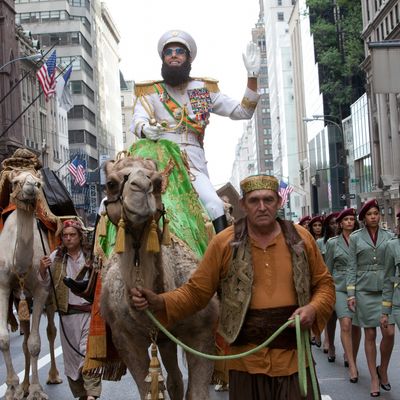
With the title character in The Dictator’s frequent appearances in a military uniform and a fur-ball beard, Sacha Baron Cohen sets us up for another piece of guerrilla clowning along the lines of Borat and Bruno. But this is a different kind of film, conventionally scripted with room for improvisation, like a Will Ferrell comedy. Many will be disappointed. I’m not. I love most of Baron Cohen’s ambush stunts, but he and director Larry Charles have the skills to make movies that don’t rely on them. (And Baron Cohen will have a tough time hoodwinking people now, given his level of fame.) The good news is that The Dictator is a loose and silly and occasionally exhilarating political farce in the tradition of Chaplin’s The Great Dictator (obviously) and the Marx Brothers’ antiwar masterpiece Duck Soup. And it comes in at a fleet 83 minutes — just right.
Baron Cohen plays Haffaz Aladeen, authoritarian ruler of a fictional African nation called Wadiya and a cross between Gadhafi and Kim Jong-Il (whom he reveres). He’s also a raging egomaniac — a true wooly bully. By law, his surname must be used in place of common words, among them both “yes” and “no,” which makes for considerable confusion in his subjects’ daily lives. But don’t disobey him or he’ll slide his hand across his throat and his guards will drag you off to be beheaded. Aladeen is building nuclear warheads, which he tells the world will be used for “peaceful purposes” — but has the giggles before getting the words out. Israel is the obvious target. For laughs, he watches tapes of the ’72 Munich Olympics massacre.
On evidence, Baron Cohen’s favorite targets are anti-Semites, portrayed as cretins, illiterates, crazies. Growing up as an Orthodox Jew in Great Britain, he must have heard his share of Holocaust stories and endured taunts, and I imagine playing anti-Semites serves a dual function — both discrediting them and allowing him to “identify with the aggressor,” which the psychiatric literature defines as “an unconscious process in which a person adopts the perspective or behavior patterns of a captor or abuser.”
He brings a palpable relish to the Jew-bashing in roles like Borat and Aladeen. And the odd thing is that he makes them likable. The true villain of The Dictator isn’t the dictator but his chief aide, Tamir, who plots to have Aladeen murdered en route to a U.N. speech. Tamir is an advocate for democracy, but not because he cares about the will of the people. Just the opposite. Turning Wadiya into a democracy will open the country to U.S. oil companies and make him wealthy. Funny how that works. I’ve never seen it spelled out quite so lucidly.
How wonderful that Baron Cohen makes us identify with the aggressor, too, rooting for Aladeen to outwit the man (an unbilled actor I won’t reveal) who kidnaps and tortures him — starting with shaming the torturer for his outdated instruments. The now beardless dictator takes refuge in a crunchy New York food co-op store overseen by a human-rights activist named Zoey, played by Anna Faris in short dark hair and with her usual exquisite timing. (She’s the most enchantingly precise space cadet in movies.) Amid some not-great jibes at feminism there’s a rousing bit in which Aladeen wins over the pinko staff by using fascist techniques on the city health inspector. Heading to the U.N. to stop the look-alike Aladeen (a half-wit — no, make that quarter-wit — shepherd played by Baron Cohen) from proclaiming Wadiya a democracy, the tall male fascist and the short, spunky female commie have an enchanting rapport. “The police here are such racists,” she says. “Yeah,” he replies, “and not in a good way.”
It’s nice to see Baron Cohen interacting with clowns at this level. Jason Mantzoukas plays Aladeen’s chief weapons scientist and unlikely New York ally Nadal so deftly that the performance might be underappreciated: Nadal is a sly operator, helping a man who’d think nothing of having him killed because that’s How Things Work in Wadiya. That African country is not as different from our own as it first appears. Aladeen’s climactic speech is a triumph of the satirist’s art, a lecture to U.S. leaders on the advantages of dictatorship over democracy — the kind of back-door, upside-down way of getting at the truth that makes artists like Baron Cohen so treasurable. I understand that The Dictator isn’t, in studio parlance, tracking so well, and that the lack of gross-out gags might make for only middling word of mouth among young males. I urge you to see it — not just because it’s good, but because it’s a potent reminder that extreme silliness does not preclude extreme seriousness.





